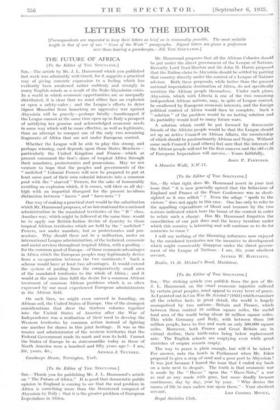LETTERS TO THE EDITOR
[Correspondents are requested to keep their letters as brief as is reasonably possible. The most suitable length is that of one of our " News of the Week" paragraphs. Signed letters are given a preference over those bearing a pseudonym.—Ed. THE SPECTATOR.]
THE FUTURE OF AFRICA
[To the Editor of THE SPECTATOR.] SIR,—The article by Mr. J. L. Hammond which you published last week was admirably well-timed, for it suggests a practical way of giving concrete expression to a feeling which has evidently been awakened rather suddenly and strongly in many English minds as a result of the Italo-Abyssinian crisis. In a world in which economic opportunities are so unequally distributed, it is clear that we must either face an explosion or open a. safety-valve ; and the League's efforts to deter Signor Mussolini from launching an aggressive war against Abyssinia will be gravely—perhaps fatally—handicapped if the League cannot at the same time open up to Italyaprospect of satisfying her genuine and acknowledged economic needs in some way which will be more effective, as well as legitimate, than an attempt to conquer one of the only two remaining fragments of Africa that are not under European control.
Whether the League will be able to play this strong, and perhaps winning, card 'depends upon those States Members— particularly the United Kingdom and France—which at present command the lion's share of tropical Africa through their mandates, protectorates and possessions. May we not venture to hope that the peoples and governments of the " surfeited " Colonial Powers will now be prepared to put at least some part of their own colonial interests into a common pool with the " starved " Powers, for the sake of honourably avoiding an explosion which, if it comes, will blow us all sky- high with an impartial disregard for the present invidious distinction between " haves " and " have-nots " ?
One way of making a practical start would be the substitution which Mr. Hammond proposes, of an international for a national administration in the mandated territories of the " B " class. Another way, which might be followed at the same time, would be to apply our British-Indian device of dyarchy to those tropical African territories which are held by the " surfeited " Powers, not under mandate, but as protectorates and pos- sessions. Why should there not be a unification, under an international League administration, of the technical, economic and social services throughout tropical Africa, with a pooling— for the common good of Europe—of those economic advantagesi in Africa which the European peoples may legitimately derive from a co-operation between the two continents ? Such a scheme would have at least two advantages. It would extend the system of pooling from the comparatively small area of the mandated territories to the whole of Africa ; and it would at the same time fulfil the desire for a common African: treatment of common African problems which is so often expressed by our most experienced European administrators in the African field.
On such lines, we might even succeed in founding, on African soil, the United States of Europe- One of the strongest considerations that drew the thirteen colonies together into the' :United States of America after .the War of Independence was a realisation of their" need to develop the Western territories by common action instead of fighting one another for shares in this joint heritage. It was as the trustee and administrator of the western territories that the Federal Government made its mark and won its hold. Cannot the States of Europe be as statesmanlike today as those of, North America were a hundred and fifty years ago ?—I
Sir, yours, &c., ARNOLD J. TOYNBEE.
Ganthorpe House, Terringlon, York.






































 Previous page
Previous page